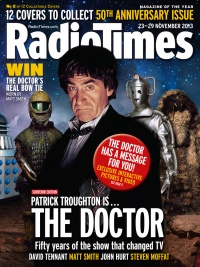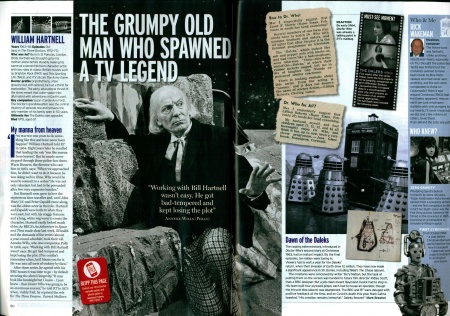The Grumpy Old Man Who Spawned a TV Legend

50th anniversary special
23 November 2013
- You Can't Destroy the Doctor
- Doctor Doctor ...
- Who's That Doctor?
- The Man in Charge
- The Grumpy Old Man Who Spawned a TV Legend
- How Charlie Chaplin Saved Doctor Who
- The Comedian Who Wanted to Be Taken Seriously
- The Time Lord Saved Me from the Building Site
- Fans Invade the Tardis
- Totally Tasteless
- No More Ferrets for Me
- The Doctor Hits America
- The Man Who Said 'No'
- One for the Ladies
- The Geek Inherits the Universe

10th (1973) | 20th (1983) | 30th (1993) | 40th (2003) | 50th (2013) | 60th (2023)
- Publication: Radio Times
- Date: 2013-11-23
- Author: Mark Braxton, Patrick Mulkern
- Page: 30
- Language: English
WILLIAM HARTNELL
Years 1963-66 Episodes 134
(also in The Three Doctors, 1972-73)
Who was he? Born in St Pancras, London, 1908, Hartnell was brought up by his mother alone before steadily making his name as a second-division character actor, with key roles in classic British movies such as Brighton Rock (1947) and This Sporting Life (1963), and ITV sitcom The Army Game.
Doctor profile Grandfatherly, often grouchy but soft-centred, he had a thirst for exploration. The early, educational thrust of the show meant that outer-space trips alternated with adventures in Earth's past.
Key companion Susan (Carole Ann Ford). The Doctor's granddaughter was the central mystery of episode one and remains the only member of his family seen in 50 years.
Ultimate foe The Daleks (see opposite)
Died 1975, aged 67
My manna from heaven
I'VE WAITED FOR years to do something like this and have never been happier," William Hartnell told RT in 1964. Eight years later he recalled that landing the role "was like manna from heaven". But he nearly never stepped through those police-box doors. Waris Hussein, the director who cast him in 1963, says: "When we approached him, he didn't want to do it because he was doing well in films. Why would he want to commit to a series? He was not only reluctant but had to be persuaded after two very expensive lunches."
But Hartnell soon grew to love the mysterious time traveller and, until John Hurt (73) and Peter Capaldi came along, was the oldest actor in the role. Hartnell and Capaldi were both 55 when they were cast, but with his craggy features and a long, white wig worn to create the character, Hartnell easily looked much older. As BBC2's An Adventure in Space and Time made clear last week, ill health and the demands of the series (almost a year-round schedule) took their toll. Anneke Wills, who was companion Polly in 1966, says: "Working with Bill Hartnell wasn't easy. He got bad-tempered and kept losing the plot. If he couldn't remember a line, he'd blame you for it. He was into all sorts of trickery by then."
After three series, he agreed with his BBC bosses it was time to go - by default securing the show's longevity "It may look like hindsight but I knew - I just knew - that Doctor Who was going to be an enormous success," he told RT in 1973 when, visibly frail, he reprised the role for The Three Doctors.
REACTION
By early 1964, Doctor Who was already a talking point in RT 's mailbag
Boo to Dr. Who!
May I respectfully suggest that Janet F. Harris (Radio Times, February 6) needs her head examining'!
Several members of out form (the sixth) have to watch Dr. Who with younger brothers and sisters, and all agree that after Steptoe it is the funniest programme on television.
The 'Daleks,' which looked like salt and pepper pots with knobs on, and had voices like a bad telephone, were hilarious. 'Then—this-is-the-end-of-the—Daleks; at which their rubber suckers sagged' left me in fits of laughter (my friends experienced similar reactions).
There is nothing realistic about this serial. Even the acting is hammy; and it does not deserve the name of science fiction—•Lillian Roberts, Charley, Lancs.
Dr. Who for All ?
May I respectfully suggest that Lillian Roberts (Radio Times, February 27) needs her head examining.
My husband, myself, and four children aged 17, 15, 12 and 4 1/2 all thoroughly enjoy Dr. Who, and think it has, up to now, been a very clever programme-- Jean Glazebrook, Rosudgeon, Cornwall
Dawn of the Daleks
The rasping exterminators, introduced in Doctor Who's second story at Christmas 1963, had an instant impact. By the final episodes, ten million were tuning in. Viewers had to wait a year for the Daleks' return, when their invasion of Earth drew 12 million. They have now made a significant appearance in 30 stories, including 1966's The Chase (above).
The creatures were conceived by writer Terry Nation, but the task of putting them on the screen was handed to future film director Ridley Scott, then a BBC designer. But a job clash meant Raymond Cusick had to step in. His team built four plywood props; each had to house an operator, though the tricycle idea (above) was abandoned. The BBC and RT were deluged with positive feedback at the time, and on Cusick's death this year, Mark Gatiss tweeted: "His creation remains immortal." Daleks forever!"
Who & Me
Rick Wakeman, musician, composer
The theme tune was fantastic, unlike anything else I'd ever heard, especially on TV. I thought the police-boy Tardis was brilliant but the costumes seemed to have been made by Blue Peter viewers who had never won anything, and the sets were comparable to those on Crossroads! I think it was around Christmas [1963] that the Daleks appeared. How on earth we took misshapen dustbins with sink plungers to our hearts, I'll never know, but we did, and I, like millions of others, loved them.
From Behind the Sofa: see p2
Pre-dating Sandra Bullock in Gravity by some 48 years, Trojan handmaiden Katarina was ejected from a spaceship airlock - and the first companion to die. In fact her death scene was the first thing actress Adrienne Hill filmed as the character in 1965, bouncing on a trampoline to simulate drifting in space.
On 8 October 1966 - a year before Christiaan Barnard performed the first heart transplant - Cybermen took organ transplant to an illogical conclusion.
Must-see moment
THE DALEKS (1963)
Five weeks after the series began came the first properly nerve jangling, companion-in-peril cliffhanger. Barbara (Jacqueline Hill) is trapped deep in a claustrophobic alien city, and screams as is the sucker of an unseen horror approaches... The full Dalek was revealed the following week.
Disclaimer: These citations are created on-the-fly using primitive parsing techniques. You should double-check all citations. Send feedback to whovian@cuttingsarchive.org
- APA 6th ed.: Mulkern, Mark Braxton, Patrick (2013-11-23). The Grumpy Old Man Who Spawned a TV Legend. Radio Times p. 30.
- MLA 7th ed.: Mulkern, Mark Braxton, Patrick. "The Grumpy Old Man Who Spawned a TV Legend." Radio Times [add city] 2013-11-23, 30. Print.
- Chicago 15th ed.: Mulkern, Mark Braxton, Patrick. "The Grumpy Old Man Who Spawned a TV Legend." Radio Times, edition, sec., 2013-11-23
- Turabian: Mulkern, Mark Braxton, Patrick. "The Grumpy Old Man Who Spawned a TV Legend." Radio Times, 2013-11-23, section, 30 edition.
- Wikipedia (this article): <ref>{{cite news| title=The Grumpy Old Man Who Spawned a TV Legend | url=http://cuttingsarchive.org/index.php/The_Grumpy_Old_Man_Who_Spawned_a_TV_Legend | work=Radio Times | pages=30 | date=2013-11-23 | via=Doctor Who Cuttings Archive | accessdate=21 May 2025 }}</ref>
- Wikipedia (this page): <ref>{{cite web | title=The Grumpy Old Man Who Spawned a TV Legend | url=http://cuttingsarchive.org/index.php/The_Grumpy_Old_Man_Who_Spawned_a_TV_Legend | work=Doctor Who Cuttings Archive | accessdate=21 May 2025}}</ref>
